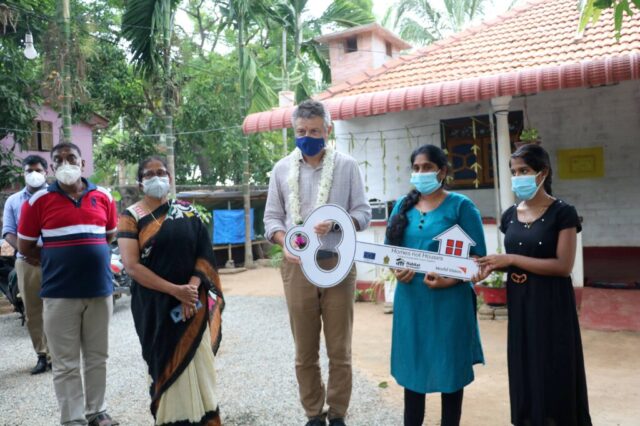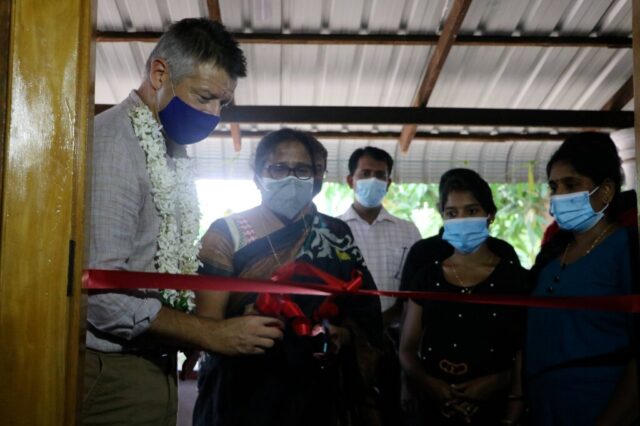
KILINOCHCHI – Representatives of the European Union (EU) ceremoniously handed over homes to owners under the ‘Homes not Houses’ project, a EUR 14 million EU funded project, implemented in the North and East of Sri Lanka. Habitat for Humanity Sri Lanka and World Vision Lanka successfully concluded this multi-year, multi-faceted undertaking that empowered more than 2,370 conflict-affected families to resettle and rebuild their lives and future through sustainable housing and community economic development.
“Our lives have taken a turn for the better. We now dare to dream of a better future for our children who want to be doctors, teachers and bankers to contribute to the development of our country. We cannot express in words the hardships we faced during the war but we can express our heartfelt gratitude towards all those who assisted us to rebuild, resettle and regain our dignity. There are many more families who need help just like us. We hope they too will receive the same support”, expressed home-owner Nagalingam Sandiran of Karaichchi, Kilinochchi.
Speaking at the handing over ceremony in Kilinochchi, EU Ambassador Denis Chaibi said “This project is about investing in people, particularly those who have gone through the hardships of violent conflict, to build on their resilience. We hope that as we invest in people, these beneficiaries will also invest in themselves and each other by working together in ways that will bring results and advance peace and reconciliation. The “Homes not Houses” project is also noteworthy for its approach, prioritising owner-driven, environmentally friendly construction. So, it is an amalgam of two EU priorities: investing in people and preserving the environment.”

“Habitat for Humanity Sri Lanka was honoured to work alongside families in need of safe and secure housing where children can study and play in a healthy environment while parents can focus on improving their livelihoods and communities can contribute to social cohesion” said Yu Hwa Li, National Director, Habitat for Humanity Sri Lanka. “We greatly appreciate the unwavering support of the European Union and World Vision Lanka that ensured a successful completion.”
With this project the EU concluded its decade long “Aid to Uprooted People” programme in the country, during which the EU provided more than EUR 50 million towards owner-driven reconstruction for over 20,000 households and internally displaced persons affected by conflicts. In addition, as compared to other existing housing programmes in the country, the project adopted an innovative “home owner driven” approach where the households contributed directly to the design and construction of their home. It also featured the use of innovative, sustainable and low-carbon construction technologies and materials locally produced such as compressed stabilized earth blocks[1] with about 45% of the houses built. It is known as one of the best examples of Habitat’s climate-sensitive initiatives where families and masons had opportunities to learn about the benefits and utilize sustainable construction technologies and materials that are an alternative to mining sand known for their negative impact on the environment but also an alternative to use of costly and carbon intensive imported cement.
Also present was the Government Agent for Kilinochchi Mrs Rubawathy Ketheeswaran who oversees the development work by several NGOs and state entities in the North related to the resettlement of IDPs. Commenting on the project Mrs. Ketheeswaran said, “It was my responsibility to promote this project’s unique concept of eco-friendly construction concept and I was able to enlighten the people about its benefits in terms of the cooling effect and efficiency in electricity consumption.”

The project also featured an economic and livelihood development component. About 46,000 people improved their self-sufficiency through skills training and livelihood support in husbandry, agriculture, home-based construction enterprises, and built resilience through disaster risk reduction mapping and drainage and culvert improvements. “It’s wonderful to see the impact of this partnership between the European Union, Habitat for Humanity and World Vision” said Shelby Stapleton, Director of International Resource development and Management, World Vision Lanka “Working together with the government and community to secure livelihoods and homes, not houses, is critical for stability and cohesion, and we are thrilled to see the fruits of this labour today”
The local government representative added “I am very grateful for the introduction of this new technology and am thankful for the EU and the implementing partners for this innovative new concept. People who used to live in inadequate housing have expressed their happiness with their new eco-friendly homes. We hope there will be support in the future too for the construction of such homes in this region.”
[1] A feasibility study published by the European Union has cited the blocks as a low-carbon, low embodied energy solution that contributes to sustainable development (https://op.europa.eu/en/publication-detail/-/publication/184b5e07-1851-11e8-ac73-01aa75ed71a1/language-en)



